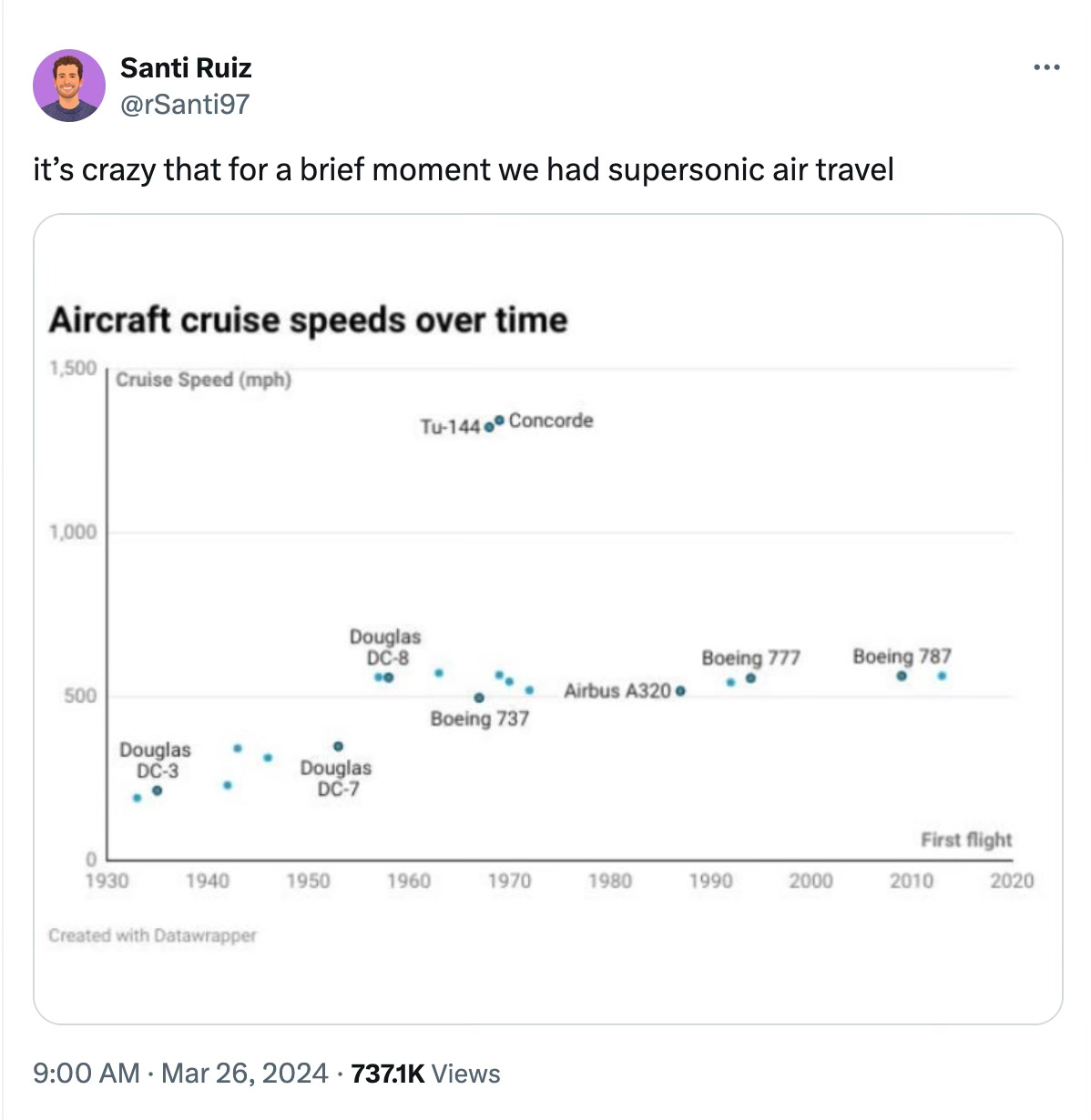Institute for Progress (IFP) — March 2024 Update
A few announcements this month:
We’re hiring for some exciting roles, including Chief of Staff, Data Fellow, and two Biotechnology Fellow positions. Come work for IFP!
We’re also excited to announce the hire of Tim Fist as a Senior Technology Fellow. Tim’s research focuses on accelerating the development of trustworthy artificial intelligence and other emerging technologies.
Distinguished Immigration Fellow Amy Nice is leading the Talent Mobility Fund, a philanthropic fund focused on helping talent move to opportunity through existing immigration pathways. And she is now also on Twitter! Check out her first thread here (hint: it’s about the O-1 visa).
And IFP work was cited in a Supreme Court petition.
Here’s what else we’ve been working on:
✍️ Written Work
In Asterisk Magazine, Co-founder Alec Stapp and Senior Infrastructure Fellow Brian Potter explained why today’s environmental regulations are too focused on process relative to results.
“In many of the most notable successes [of the environmental movement], like cleaning up the pesticide DDT or fixing the hole in the ozone layer, what moved the needle were ‘substantive’ standards, which mandated specific outcomes. By contrast, many of the regulatory statutes of the late 60s were ‘procedural’ laws, requiring agencies to follow specific steps before authorizing activities… Today, those procedural laws make it much harder to build the new infrastructure needed to avert climate change and decarbonize. The laws created by the environmental movement now harm the environment.”
ICYMI, Alec also wrote a piece for American Affairs about how to actually change policy at the federal level.
“In an era of polarized politics, the combination of bicameralism, the Senate filibuster, presidentialism, adversarial legalism, and federalism has resulted in a vetocracy. While this institutional arrangement makes policy change in the United States difficult, progress is possible. Federal policies can include carrots and sticks for state and local governments to get them onboard. Legislation can include limitations on the scope of judicial review to provide more certainty regarding federal actions. And advocates can modify their proposals to be included in must-pass legislation. Only policy entrepreneurs who have a clear-eyed view of the bottlenecks to U.S. state capacity can work to unlock them.”
🏗️ Construction Physics, by Senior Infrastructure Fellow Brian Potter
🏛️ Statecraft, by Senior Editor Santi Ruiz
This month, Statecraft did a deep dive into nation-building efforts in Iraq and Afghanistan, interviewing four American officials who worked on these policies:
📰 Media
Infrastructure Fellow Aidan Mackenzie weighed in on a new bill, the Geothermal Energy Optimization Act, for Heatmap News.
“The bill would also create a ‘strike team’ within the BLM that could advise field offices and staff on how to process and deal with geothermal permits. ‘The agency needs to implement it — and care about implementing — for it to work out well,’ Aidan Mackenzie, a fellow at the Institute for Progress, told me.”
The Competitive Enterprise Institute flagged an observation from Alec: “The federal government is currently subsidizing electric vehicle charging stations while also placing multiple restrictions on how and where they can be built.”
The Bipartisan Policy Center explained our proposal to use data to better understand pressing labor shortages.
Challenge Works highlighted our work helping the National Science Foundation experiment with how it funds science.


Why should we be favoring immigration of foreign elites over our present overproduction of candidates for our own elite, a group selected less for merit, than for conformity, a group who in turn have driven our own geniuses out of not only power but employability? Problem-solving ability, intelligence, is measurable as the difficulty of problems one can answer. It is the best single predictor of job performance, a validity of over 0.6, more than three times as good as education and experience combined. But the correlation of ability with income is only 0.3 on the NLSY79 (2004, on thousands of US Boomers), and even lower among the top half of the population. The correlation with wealth is even lower, 0.16., with no correlation at all in the top half of the population. This can't happen without systematic, intentional discrimination against more-able people.
Apparently, it isn't enough to drive everyone smart or honest out of every institution, particularly geniuses, those disagreeable intellects who go against the group think of academia / NGO /corporate /government aparatchiks, we must import tractible aliens to replace them.
No one with a heart, or half a brain, hires a worker on an H-1B visa anymore ! L-1 is the way to go.
Big co.'s file as many petitions as they can to prove a "workers shortage" - which does not exist.
What does exist, still, is the special hell US politicians created for the spouses (read: wives) of the H-1B workers by creating the H-4 visa.
Coming in on an O-1 visa, a complicated procedure, thus very lucrative to immigration lawyers, does not remedy this issue. O-3 spouses are also not allowed to have a life in the US.
This country will never be able to bring in "the best and brightest: unless it starts to treat the spouses as human beings too !
P.S. Why are you forcing people to get an account on X (formerly Twitter) to get information and possibly have a discussion ? You have a Substack and a website.